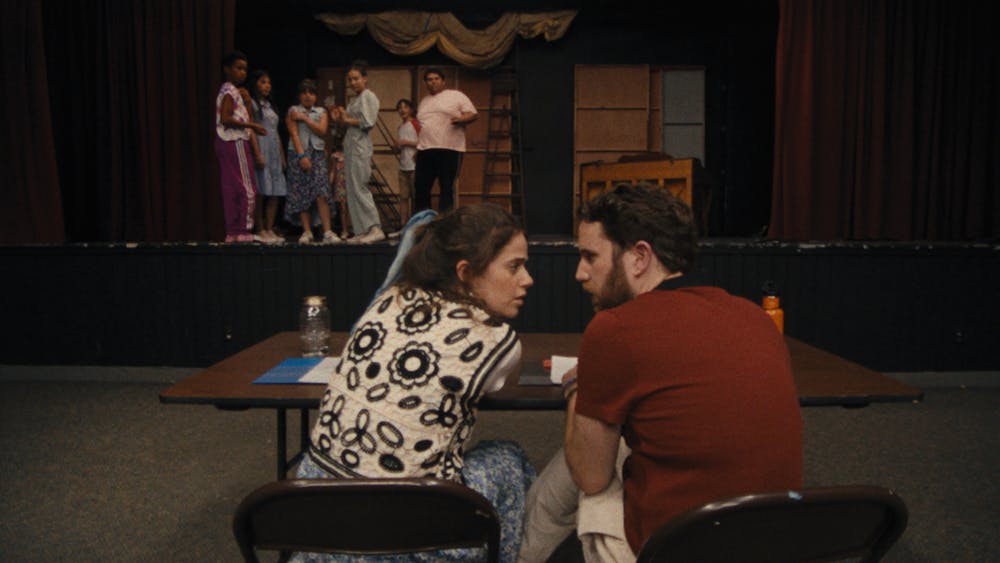Imagine the awkwardness of teen summer camp but with a thespian twist. An image darts to mind, vivid for those who’ve experienced youth theater, perhaps still vivid for those who haven’t. You’ve probably thought up some variation of AdirondACTS, the chintzy theater camp in Upstate New York attended each summer by Broadway’s future talent. Molly Gordon and Nick Lieberman’s 2023 mockumentary “Theater Camp” explores AdirondACTS’s quirky dynamics from the inside, yielding gut-busting moments of comedy as well as an overarching emotional narrative in the process.
No more than five minutes into the film’s runtime, AdirondACTS founder Joan Rubinsky (Amy Sedaris) suffers a seizure — a pulsing strobe at a school performance of “Bye Bye Birdie” sends her into an abrupt coma. Her yearly search for the country’s rising stars comes to a close, and her leadership position at AdirondACTS is left open for the summer: What could possibly go wrong in her unexpected absence?
The central plot of “Theater Camp” revolves around AdirondACTS’s eccentric staff and their desire to continue operating the camp despite conflict, a competing neighboring summer camp and financial struggles in Joan’s absence. The comedy that flourishes in this simple narrative quickly emerges as the film’s crown jewel.
Troy (Jimmy Tatro), Joan’s business-influencer son, takes the reins at AdirondACTS, but his lack of theater knowledge is evident even before he speaks — he’s unwieldy, absorbed in his phone and terrified. Once all of the youngsters have shown up, he gathers the courage for a speech — only for his enthusiasm to be met by radio silence. It’s an awkward moment that’s alleviated by acting teacher Amos Klobuchar (Ben Platt), who seizes the mic from Troy and sings the opening note of “Oh, What a Beautiful Mornin’” from “Oklahoma!” The kids are suddenly held at attention like marionettes from a string — it’s theater camp after all.
For the next few weeks, the children take a myriad of classes in different theater disciplines — stagecraft, singing and onstage combat — all taught by the eclectic personalities of the camp’s higher-ups. Rebecca Diane (Molly Gordon) and Klobuchar — the singing and acting teachers respectively — set out to collaboratively write a performance piece titled “Joan, Still” in honor of the camp’s founder.
This motley mix of counselors could only ever come together at a place like AdirondACTS. The young costume director is banned from giving piercings to actors as he did in previous summers. An under-qualified stage-combat teacher — who doesn’t even know what stage combat is — has a lightness that contrasts with the overly serious personalities of her colleagues. And the dance director expresses a penchant for interpretive performance. It's a quirky, bizarre crew that anchors the comedy and allows the children to flourish under their guidance.
Despite being fiction, the repeated use of a shaky handheld camera gives the film a documentary-like feel. This filming yields an intimacy between viewers and those onscreen while also imbuing the narrative with some sense of legitimacy. It also serves as a crutch for the comedy, which flourishes in moments of absurdity that are meant to appear real.
What is most special about “Theater Camp” is its honoring of youth talent. As ridiculous a setting as AdirondACTS is, the film pays special care to the children who attend it. Strong performances led by Luke Islam, Bailee Bonick and Alan Kim reveal that these campers are quite talented — one girl holds impressively long notes, another caps off an audition with flourishing vocals all while a different camper confidently acts as producer. These kids are shown to be the future, and AdirondACTS is their jumping-off point.
As sappy, informal and underfunded as it is, there’s no denying the summer camp’s power. In one of the film's final scenes, as the kids sing about the memories they’ve made at AdirondACTS in the closing song of “Joan, Still,” a lull sweeps over the crowd. The performance is both moving and a solid ending note which nicely honors Joan and her summer camp.
While heartwarming, the primary draw of “Theater Camp” still lies in its laughability. The comedy inspires viewers to reflect on their own peculiar memories of summer camp, however related to theater they may be.





